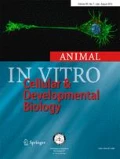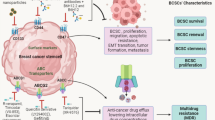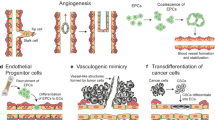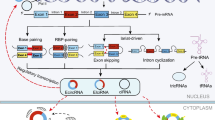Abstract
Curcumin has been shown to regulate the expression of genes implicated in tumor cell proliferation, metastasis, chemotherapy resistance, and angiogenesis. Endothelial progenitor cells (EPCs) have been recently described in the peripheral blood as cells contributing to both physiological and pathological angiogenesis. In the current study, we evaluated the effect of curcumin on these angiogenic cells. EPCs were isolated, expanded, and characterized ex vivo. These cells were then treated with different concentrations of curcumin. The formation of EPC colonies in culture and their proliferation was analyzed by 5′-bromo-2′-deoxyuridine assays in absence and presence of curcumin. Further, the expression of two important cell cycle inhibitory proteins, p21 and p53, in the curcumin- and culture medium-treated cells without curcumin was evaluated by intracellular flow cytometry. The results showed that there was a significant decrease in the formation of EPC colonies in culture. EPC proliferation was significantly inhibited by curcumin in a dose-dependent manner. Flow cytometry analysis showed a twofold increase in the expression of both p21 and p53 in curcumin-treated cells as compared to the medium-treated cells, suggesting that curcumin inhibits EPC growth by mainly inhibiting the G1 to S phase transition in the cell cycle. It would be further worthwhile to study the effect of curcumin on EPC-mediated angiogenic activity.




Similar content being viewed by others
References
Aggarwal S, Ichikawa H, Takada Y et al (2006) Curcumin (diferuloylmethane) down-regulates expression of cell proliferation and antiapoptotic and metastatic gene products through suppression of IkappaBalpha kinase and Akt activation. Mol Pharmacol 69:195–206
Anand K, Sarkar A, Kumar A et al (2012) Combinatorial antitumor effect of naringenin and curcumin elicit angioinhibitory activities in vivo. Nutr Cancer 64:714–724
Bae MK, Kim SH, Jeong JW et al (2006) Curcumin inhibits hypoxia-induced angiogenesis via down-regulation of HIF-1. Oncol Rep 15:1557–1562
Bhandarkar SS, Arbiser JL (2007) Curcumin as an inhibitor of angiogenesis. Adv Exp Med Biol 595:185–195
Cheng CC, Chang SJ, Chueh YN et al (2013) Distinct angiogenesis roles and surface markers of early and late endothelial progenitor cells revealed by functional group analyses. BMC Genomics 14:182
Chew HW, Huang HC (1998) Effect of curcumin on cell cycle progression and apoptosis in vascular smooth cells. Br J Pharmacol 124:1029–1040
Deng G, Yu JH, Ye ZQ et al (2008) Curcumin inhibits the expression of vascular endothelial growth factor and androgen-independent prostate cancer cell line PC-3 in vitro. Natl J Androl 14:116–121
Gartel AL (2008) Transcriptional inhibitors, p53 and apoptoss. Biochim Biophys Acta 1786:83–86
Gogada R, Amadori M, Zhang H et al (2011) Curcumin induces Apaf-1-dependent, p21-mediated caspase activation and apoptosis. Cell Cycle 10:4128–4137
Hassan ZK, Daghestani MH (2012) Curcumin effect on MMPs and TIMPs genes in a breast cancer cell line. Asian Pac J Cancer Prev 13:3259–3264
Hill JM, Zalos G, Halcox JP, Schenke WH et al (2003) Circulating endothelial progenitor cells, vascular function, and cardiovascular risk. N Engl J Med 348:593–600
Hristov M, Weber C (2004) Endothelial progenitor cells: characterization, pathophysiology, and possible clinical relevance. J Cell Mol Med 8:498–508
Kaur S, Bajwa P (2013) A 'tête-à tête' between cancer stem cells and endothelial progenitor cells in tumor angiogenesis. Clin Transl Oncol 16:115–121
Kaur S, Jayakumar K, Kartha CC (2007) The potential of circulating endothelial progenitor cells to form colonies is inversely proportional to total vascular risk score in patients with coronary artery disease. Indian Heart J 59:475–481
Kaur S, Tripathi D, Dongre K et al (2012) Increased number and function of endothelial progenitor cells stimulate angiogenesis by resident liver sinusoidal endothelial cells (SECs) in cirrhosis through paracrine factors. J Hepatol 57:1193–1198
Killian PH, Kronski E, Michalik KM (2012) Curcumin inhibits prostate cancer metastasis in vivo by targeting the inflammatory cytokines CXCL1 and −2. Carcinogenesis 33:2507–2519
Li Calzi S, Neu MB, Shaw LC et al (2010) EPCs and pathological angiogenesis: when good cells go bad. Microvesc Res 79:207–216
Lin HJ, Su CC, Lu HF et al (2010) Curcumin blocks migration and invasion of mouse-rat hybrid retina ganglion cells (N18) through the inhibition of MMP-2, -9, FAK, Rho A and Rock-1 gene expression. Oncol Rep 23:665–670
Mo N, Li ZQ, Li J, Cao YD et al (2012) Curcumin inhibits TGF-β1-induced MMP-9 and invasion through ERK and Smad signaling in breast cancer MDA- MB-231 cells. Asian Pac J Cancer Prev 13:5709–5714
Mukhopadyay A, Banerjee S, Stafford LJ et al (2002) Curcumin-induced suppression of cell proliferation correlates with down-regulation of cyclin D1 expression and CDK4-mediated retinoblastoma protein phosphorylation. Oncogene 21:8852–8861
Neise D, Sohn D, Budach W et al (2010) Evidence for a differential modulation of p53-phosphorylating kinases by the cyclin-dependent kinase inhibitor p21WAF1/CIP1. Cell Cycle 9:3575–3583
Oyagbemi AA, Saba AB, Ibraheem AO (2009) Curcumin: from food spice to cancer prevention. Asian Pac J Cancer Prev 10:963–967
Prakobwong S, Khoontawad J, Yongvanit P et al (2011) Curcumin decreases cholangiocarcinogenesis in hamsters by suppressing inflammation-mediated molecular events related to multistep carcinogenesis. Int J Cancer 129:88–100
Ranjan AP, Mukerjee A, Helson L et al (2013) Efficacy of liposomal curcumin in a human pancreatic tumor xenograft model: inhibition of tumor growth and angiogenesis. Anticancer Res 33:3603–3609
Rowan S, Ludwig RL, Haupt Y et al (1996) Specific loss of apoptotic but not cell-cycle arrest function in a human tumor derived p53 mutant. EMBO J 15:827–838
Sharma RA, Gescher AJ, Steward WP (2005) Curcumin: the story so far. Eur J Cancer 41:1955–1968
Shehzad A, Lee J, Lee YS (2013) Curcumin in various cancers. Biofactors 39:56–68
Sherr CJ (2000) The Pezcoller lecture: cancer cell cycles revisited. Cancer Res 60:3689–3695
Singh RP, Agarwal R (2006) Mechanisms of action of novel agents for prostate cancer chemoprevention. Endocr Relat Cancer 13:751–778
Smith ML, Fornace AJ Jr (1996) The two faces of tumor suppressor p53. Am J Pathol 148:1019–1022
Wang LQ, Shi HS, Wang YS (2013) Liposomal curcumin inhibits tumor growth and angiogenesis in Lewis lung cancer. J Sichuan Univ Med Sci Edit 44:46–48
Wilken R, Mysore S, Veena WMB et al (2011a) Curcumin: a review of anti-cancer properties and therapeutic activity in head and neck squamous cell carcinoma. Mol Cancer 10:12
Wilken R, Veena MS, Wang MB et al (2011b) A review of anti-cancer properties and therapeutic activity in head and neck squamous cell carcinoma. Mol Cancer 7(10):12
Zhang Y, Cao H, Hu YY et al (2010) Inhibitory effect of curcumin on angiogenesis in ectopic endometrium of rats with experimental endometriosis. Int J Mol Med 27:87–94
Acknowledgments
We are grateful to the Vice Chancellor, Guatam Buddha University for providing us the facilities to conduct the study. We are also thankful to Dr. Nirupma Trehanpati, Associate Professor, Institute of Liver and Biliary Sciences for the flow cytometry studies.
Author information
Authors and Affiliations
Corresponding author
Additional information
Editor: Tetsuji Okamoto
Rights and permissions
About this article
Cite this article
Vyas, D., Gupt, S., Dixit, V. et al. To study the effect of curcumin on the growth properties of circulating endothelial progenitor cells. In Vitro Cell.Dev.Biol.-Animal 51, 488–494 (2015). https://doi.org/10.1007/s11626-014-9852-0
Received:
Accepted:
Published:
Issue Date:
DOI: https://doi.org/10.1007/s11626-014-9852-0




